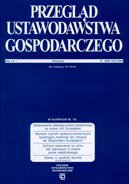Journal of Business Law 04/2022
ISSN: 0137-5490
Pages: 58
Publication date: 2022
Place publication: Warszawa
Binding: paperback
Format: A4
Publication date: 2022
Place publication: Warszawa
Binding: paperback
Format: A4
DOI: 10.33226/0137-5490.2022.4.1
JEL: K2, K3
DOI: 10.33226/0137-5490.2022.4.2
JEL: H57, H76
DOI: 10.33226/0137-5490.2022.4.3
JEL: H20, K34
DOI: 10.33226/0137-5490.2022.4.4
JEL: K20, K22
DOI: 10.33226/0137-5490.2022.4.5
JEL: K23, K24
DOI: 10.33226/0137-5490.2022.4.6
JEL: K12, K22
DOI: 10.33226/0137-5490.2022.4.7
JEL: K23
| Odbiór osobisty | 0 € |
| Kurier Inpost | 4 € |
| Kurier FedEX | 4 € |
| Inpost Paczkomaty | 4 € |
| Free delivery in Reader's Club | from 47 € |

